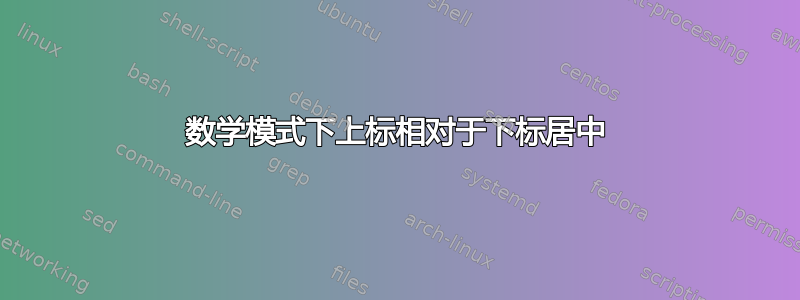
我认为最好的解释是我的尝试:
\documentclass{report}
\usepackage{amsmath}
\usepackage{graphicx}
\newcommand{\supsub}[2]{\hspace{-0.6em}
\begin{tabular}{c}
{\scriptsize #1} \\[-1.3ex]
{\scriptsize #2}
\end{tabular}\hspace{-0.6em}
}
\begin{document}
This is an example of how the command would be used:
\begin{equation*}
\text{M} \supsub{$a,\dots,a$}{$a,a,\dots,a,a$} \text{M}
\end{equation*}
However, you can see here that the horizontal and vertical
alignment is not quite right:
\begin{equation*}
\text{M} \supsub{$a$}{$a$} \text{M}
\quad
\text{M}^a_a \text{M}
\end{equation*}
The subscript and the superscript are both too low, and are probably
not the correct distance from the ``M''s. I think there is a better way
to do it than eyeballing it and manually changing the dimensions. Also,
it messes up the spacing for inline equations:
$\text{M} \supsub{$a$}{$a$} \text{M}$.
This line has extra vertical space above and below it, as you can see
by this nonsense line that I added just to show you the spacing
around it.
\end{document}
答案1
将它们设置在大小相等的框中。使用 可以轻松支持此功能\eqmakebox[<tag>][<align>]{<stuff>};这将设置<stuff>一个跨所有 s 的最大宽度框<tag>(带有条件<align>:left、centre(默认)或r右对齐):
\documentclass{article}
\usepackage{amsmath,eqparbox}
\begin{document}
This is an example of how the command would be used:
\[
\text{M}
^{\eqmakebox[aaa]{$\scriptstyle a,\dots,a$}}
_{\eqmakebox[aaa]{$\scriptstyle a,a,\dots,a,a$}}
\text{M}
\]
\end{document}
编译至少两次,并改变任何<tag>ged中的最大宽度\eqmakebox。
答案2
您可以吸收下标和上标,测量它们,然后应用它们。
\documentclass{report}
\usepackage{amsmath,xparse}
\makeatletter
\newsavebox{\supsub@sup}
\newsavebox{\supsub@sub}
\newlength{\supsub@wd}
\NewDocumentCommand{\supsub}{me{^_}}{%
\sbox\supsub@sup{$\m@th\scriptstyle\IfValueT{#2}{#2}$}%
\sbox\supsub@sub{$\m@th\scriptstyle\IfValueT{#3}{#3}$}%
\setlength{\supsub@wd}{\wd\supsub@sup}%
\ifdim\supsub@wd<\wd\supsub@sub
\setlength{\supsub@wd}{\wd\supsub@sub}%
\fi
#1%
\IfValueT{#2}{^{\makebox[\supsub@wd]{\usebox{\supsub@sup}}}}%
\IfValueT{#3}{_{\makebox[\supsub@wd]{\usebox{\supsub@sub}}}}%
}
\makeatother
\begin{document}
This is an example of how the command would be used:
\begin{equation*}
\supsub{\mathrm{M}}^{a,\dots,a}_{a,a,\dots,a,a} \mathrm{M}
\end{equation*}
\end{document}
如果您喜欢不同的语法:
\documentclass{report}
\usepackage{amsmath}
\makeatletter
\newsavebox{\supsub@sup}
\newsavebox{\supsub@sub}
\newlength{\supsub@wd}
\newcommand{\supsub}[2]{%
\sbox\supsub@sup{$\m@th\scriptstyle#1$}%
\sbox\supsub@sub{$\m@th\scriptstyle#2$}%
\setlength{\supsub@wd}{\wd\supsub@sup}%
\ifdim\supsub@wd<\wd\supsub@sub
\setlength{\supsub@wd}{\wd\supsub@sub}%
\fi
^{\makebox[\supsub@wd]{\usebox{\supsub@sup}}}%
_{\makebox[\supsub@wd]{\usebox{\supsub@sub}}}%
}
\makeatother
\begin{document}
This is an example of how the command would be used:
\begin{equation*}
\mathrm{M}\supsub{a,\dots,a}{a,a,\dots,a,a} \mathrm{M}
\end{equation*}
\end{document}
请注意,这\text{M}是不正确的:如果您想确保“M”是直立的,请使用\mathrm{M}。此外,在数学显示环境之前留一个空行也是错误的。
答案3
这是一个非常简短和简单的解决方案,无需额外的包或宏:
\documentclass{article}
\usepackage{amsmath}
\begin{document}
\setbox0\hbox{$\scriptstyle a,a,\dots,a,a$}
\setbox2\hbox to \wd0{\hss$\scriptstyle a,\dots,a$\hss}
The correct placement:
\[ \text{M}_{\box0}^{\box2}\text{M} \]
\end{document}




